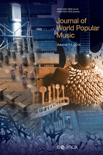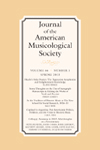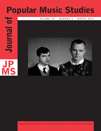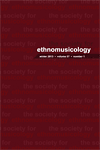
Journal of World Popular Music
Scope & Guideline
Illuminating the Sociocultural Impact of Global Melodies
Introduction
Aims and Scopes
- Global Popular Music Studies:
The journal focuses on the production, consumption, and impact of popular music across different cultures and regions, exploring how local and global dynamics shape musical practices. - Interdisciplinary Methodologies:
Research published in the journal employs a range of methodologies, including ethnographic fieldwork, qualitative analysis, and critical discourse analysis, to investigate the complexities of popular music. - Cultural and Social Contexts:
The journal examines the social, political, and economic contexts of popular music, including issues of identity, representation, and community, particularly in relation to marginalized voices. - Impact of Technology and Media:
The journal explores the influence of technology and media on music production and dissemination, including the role of social media and digital platforms in shaping contemporary music landscapes. - Music and Globalization:
The journal critically analyzes the processes of globalization as they pertain to music, investigating how cultural exchanges and hybridization occur within the realm of popular music.
Trending and Emerging
- Impact of COVID-19 on Music:
A significant number of recent articles address the effects of the COVID-19 pandemic on music communities, events, and practices, highlighting how artists and audiences have adapted to unprecedented challenges. - Digital and Online Music Practices:
There is an increasing focus on digital music practices, including online performances and the role of social media in music dissemination, reflecting the changing landscape of how music is created and experienced. - Gender and Representation in Music:
Emerging discussions around gender balance and representation in music festivals and scenes indicate a growing awareness and critique of gender dynamics within the industry. - Migration and Transnational Influences:
Research on migration patterns and their influence on music production and identity formation is gaining traction, reflecting broader discussions of globalization and cultural exchange. - Sustainability and Cultural Resilience:
The journal is increasingly addressing themes of sustainability in music practices, particularly in the context of cultural resilience during crises, such as the pandemic.
Declining or Waning
- Traditional Music Forms:
There has been a noticeable decline in the exploration of traditional music forms, as the focus shifts towards contemporary popular music and its intersections with global trends. - Historical Music Analysis:
Research centered on historical analyses of specific genres or movements has waned, with more emphasis placed on current practices and emergent trends in popular music. - Local Music Scenes in Isolation:
While local music scenes were previously a focus, particularly in pre-pandemic studies, the current trend shows a pivot towards examining the global interconnectedness and responses to crises, such as the COVID-19 pandemic.
Similar Journals

ACTA MUSICOLOGICA
Fostering Innovative Research in MusicologyACTA MUSICOLOGICA, published by the International Musicological Society, stands as a pivotal journal within the field of Musicology, garnering attention from scholars and practitioners alike. With its ISSN 0001-6241, the journal serves as a vital platform for innovative research and discourse from 2002 to 2013 and again from 2016 to 2024, achieving a Q2 ranking in the 2023 Music category. Reflecting a commitment to excellence, it ranks #105 out of 180 in Arts and Humanities Music according to Scopus, placing it at the 41st percentile among its peers. Although not open access, ACTA MUSICOLOGICA ensures the dissemination of significant musical research, fostering scholarly exchange and exploration. This esteemed publication is essential for researchers, professionals, and students looking to deepen their understanding of musicology and contribute to ongoing academic conversations.

REVUE DE MUSICOLOGIE
Cultivating Knowledge in the Art of SoundREVUE DE MUSICOLOGIE is a prominent academic journal dedicated to the diverse field of musicology, published by EDITIONS TRANSATLANTIQUES in France. With an ISSN of 0035-1601, this journal has been a key platform for researchers and scholars since its inception, fostering scholarly discourse and advancing the understanding of music's cultural, theoretical, and historical dimensions. Although it currently holds a Q4 category in Music according to the 2023 quartiles and is ranked #140 in the Scopus Arts and Humanities Music category, REVUE DE MUSICOLOGIE continues to publish valuable insights that contribute to the global musicological landscape. The journal does not offer open access, adhering to standard subscription models. Its primary objective is to provide a rigorous forum for original research articles, reviews, and theoretical discussions, making it an essential resource for academics, professionals, and students in the field of musicology. Located at 50 RUE JOSEPH DE MAISTRE, 75018 PARIS, FRANCE, it promises to remain a vital part of music research through 2023 and beyond.

INTERNATIONAL REVIEW OF THE AESTHETICS AND SOCIOLOGY OF MUSIC
Unveiling the Aesthetic Dimensions of Musical ExperienceThe INTERNATIONAL REVIEW OF THE AESTHETICS AND SOCIOLOGY OF MUSIC, published by the Croatian Musicological Society, is a pivotal scholarly journal dedicated to the intricate intersection of music, aesthetics, and sociology. With a special focus on exploring the cultural and social dimensions of music, this journal serves as a platform for researchers, professionals, and students alike to disseminate innovative ideas and transformative research. Although it operates under a traditional access model, the journal's impact within the field of music studies is underscored by its commendable Scopus ranking in the Q3 category and its established history from 2009 to 2016, with a renewed focus from 2018 to 2023. With an ISSN of 0351-5796, it continues to shape academic discourse with its insightful contributions and is essential for those aiming to engage deeply with the evolving dynamics of music in society.

Problemy Muzykalnoi Nauki-Music Scholarship
Exploring the Depths of Music ScholarshipWelcome to Problemy Muzykalnoi Nauki-Music Scholarship, a leading journal in the field of music scholarship published by the esteemed Gnesin Russian Academy of Music. With an ISSN of 2782-358X and an E-ISSN of 2782-3598, this Open Access journal has been committed to the dissemination of high-quality research since 2009, making scholarly work accessible to a global audience. Covering diverse aspects of music theory, history, and its socio-cultural impacts, Problemy Muzykalnoi Nauki serves as an essential platform for scholars, educators, and practitioners in the arts and humanities, as well as in social sciences related to music education. While its Scopus coverage was discontinued in 2021, the journal remains influential, holding a rank of #48 in the Arts and Humanities category and a percentile of 67th, showcasing its relevance and rigor in the discipline. We invite researchers and students alike to explore the rich contributions made within these pages, fostering a deeper understanding and appreciation of music in contemporary society.

JOURNAL OF THE AMERICAN MUSICOLOGICAL SOCIETY
Exploring the depths of musical understanding.JOURNAL OF THE AMERICAN MUSICOLOGICAL SOCIETY, published by University of California Press, is a prestigious peer-reviewed journal dedicated to advancing the field of musicology. With an ISSN of 0003-0139 and E-ISSN 1547-3848, this journal has been a cornerstone of scholarly communication since its inception in 1970 and continues to be relevant through 2024. Its esteemed standing is reflected in its Q2 ranking in the Music category and a respectable 71/180 ranking in the Arts and Humanities discipline, placing it in the 60th percentile among its peers. The journal provides an essential platform for researchers, professionals, and students to explore diverse topics in musicology, ranging from historical studies to contemporary analyses. While it does not currently offer Open Access options, its rigorous editorial standards ensure the publication of high-quality research that contributes significantly to the academic dialogue in music studies. With its address based in the United States at 155 Grand Ave, Suite 400, Oakland, CA 94612-3758, the journal remains a vital resource for those seeking to deepen their understanding of the complexities of music and its societal impacts.

Oido Pensante
Bridging Theory and Practice in Music ResearchOido Pensante is a prominent open-access journal dedicated to the multifaceted field of music, published by the esteemed University of Buenos Aires, specifically through its Faculty of Philosophy and Letters, Institute of Anthropological Sciences. Since its inception in 2013, this journal has fostered a rich platform for scholarly discourse and innovative research at the intersection of music and cultural studies. With an ISSN of 2250-7116, Oido Pensante aims to bridge theoretical frameworks and practical applications, making significant contributions to the understanding of music in its social context. Currently, it holds an impressive Q3 ranking in the Arts and Humanities – Music category for 2023, with a Scopus rank of #99 out of 180 journals, reflecting its commitment to academic rigor and relevance. The journal's open access policy ensures that research is widely disseminated and accessible, making it an invaluable resource for researchers, professionals, and students alike in Argentina and beyond. With converged years from 2017 to 2024, Oido Pensante continues to expand its reach, encouraging intellectual exchange and stimulating dialogue within the music community.

Opus
Bridging Theory and Practice in Music ResearchOpus is an esteemed open-access journal published by the Associação Nacional de Pesquisa e Pós-Graduação em Música in Brazil, focusing on the field of music studies. With an ISSN of 1517-7017, Opus has been dedicated to fostering innovative research since its inception and has embraced the open-access model since 2009, ensuring that its findings are readily accessible to scholars and enthusiasts globally. The journal has achieved a commendable Q2 ranking in Music as of 2023, showcasing its impact and relevance within the arts and humanities. Although currently ranked #130 out of 180 in Scopus in the music category, Opus maintains a commitment to enhancing the scholarly discourse in musicology through empirical studies, theoretical analyses, and interdisciplinary approaches. The journal's convergence over the years, from 2017 to 2024, reflects its dedication to evolving educational and research methodologies in music. Situated in the vibrant academic landscape of Campinas, SP, Brazil, Opus invites researchers, professionals, and students to contribute to its mission of exploring the multifaceted dimensions of music.

Journal of Popular Music Studies
Bridging Disciplines Through the Power of MusicJournal of Popular Music Studies, published by University of California Press, is a preeminent academic journal dedicated to the exploration and analysis of popular music and its cultural implications. With an ISSN of 1524-2226 and an E-ISSN of 1533-1598, this journal encompasses a range of methodologies, encouraging interdisciplinary dialogue across fields such as musicology, cultural studies, and sociology. Since its inception in 1988, it has provided a platform for critical examination of popular music through various lenses, contributing significantly to the understanding of music in contemporary society. The journal maintains a robust reputation, currently holding a Q2 ranking in the Music category of Scopus, positioning itself within the 58th percentile among its peers. As an invaluable resource for researchers, professionals, and students alike, the Journal of Popular Music Studies remains committed to fostering innovative scholarship and discussions that illuminate the impact of popular music on social and cultural landscapes.

ETHNOMUSICOLOGY
Fostering Dialogue in the World of EthnomusicologyETHNOMUSICOLOGY, published by SOC ETHNOMUSICOLOGY INC, is a premier journal that stands at the intersection of music, anthropology, and cultural studies. With an ISSN of 0014-1836 and an E-ISSN of 2156-7417, this journal has made significant contributions to the field since its inception in 2002, and continues to engage with contemporary issues through to 2024. ETHNOMUSICOLOGY is indexed in esteemed databases and ranks impressively in its respective categories, including Q2 in Cultural Studies and Music, and Q3 in Anthropology for the year 2023. Its Scopus rankings reflect its robust academic impact, placing it in the 79th percentile for Music within the Arts and Humanities, and 78th in Cultural Studies. The journal provides a vital platform for the dissemination of innovative research and fosters scholarly dialogue among researchers, professionals, and students interested in understanding the complex relationships between music and culture across the globe.

LIED UND POPULARE KULTUR-SONG AND POPULAR CULTURE
Celebrating Voices in Music and SocietyLIED UND POPULARE KULTUR-SONG AND POPULAR CULTURE, published by WAXMANN VERLAG GMBH, is a unique interdisciplinary journal that delves into the rich interconnections between song and popular culture, facilitating discourse among researchers, professionals, and students interested in cultural studies and musicology. With ISSN 1619-0548, this prestigious journal serves as a crucial platform for scholarly analysis, critical reviews, and innovative research exploring various facets of popular music and cultural expressions in Germany and beyond. Although classified in the 2023 Scopus category quartiles as Q4 in both Cultural Studies and Music, the journal maintains an essential role in fostering engagement and reflection on evolving cultural practices. Although it is not available as Open Access, articles from the journal have previously contributed valuable insights and shaped the conversation on popular culture from its inception in 2002 to its recent issues in 2023. Researchers will find this journal particularly relevant for its focus on underrepresented voices and themes within the cultural landscape.